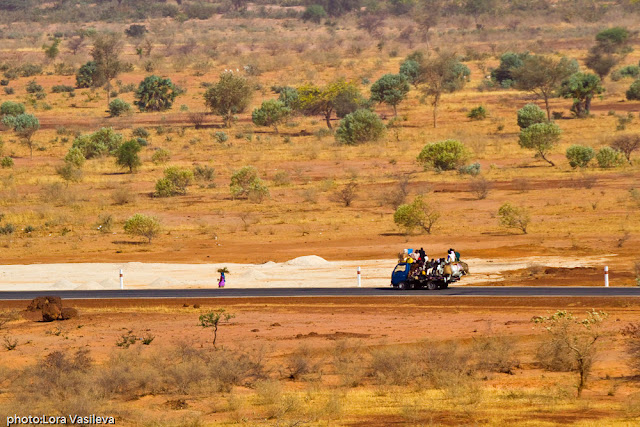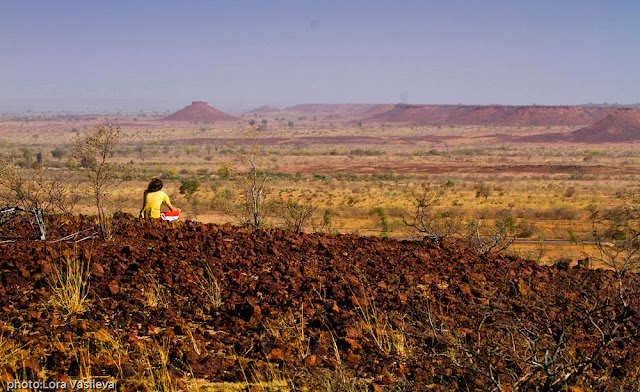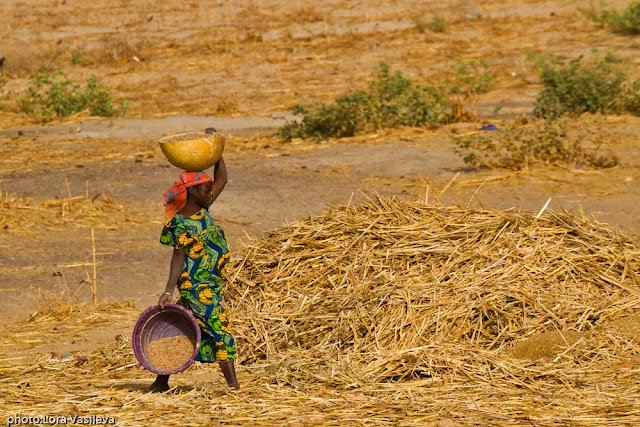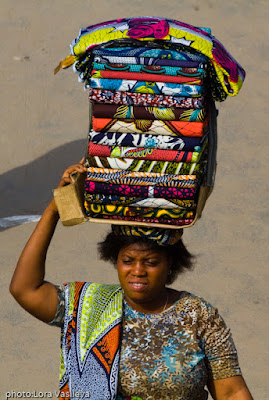
Benin – the birth place of vodum (or voodoo as it is called across the ocean). We saw vodum fetish statues and markets for dead animals, and many local gin, which is used for ceremonies. We saw also many alive animals which are more interesting for us.
In Benin we entered with two Togolese with SUV, which left us in Grand Popo - a town on the ocean with beautiful beaches. Along the way we saw Erwin – the photographer with motorbike and chased him all the way to the border. We finally caught him at the police post, where he was taking a visa. We made an appointment at a reggae bar in Grand Popo and not long after we met there. We were talking about how we passed the last days when an elderly German, who we met at the Embassy of Ghana in Ouagadougou, came. We all went to eat in the village and the German showed us a wonderful camping on the beach only for 500 CFA per person (approximately EUR 1.50). We stayed there two days. Then we difficultly parted with carefree beach life and went to the big city.
 |
Fish is caught by throwing large nets in the ocean and after the whole village is pulling them out for hours
|
 |
"shitting prohibited. Fine 5000 francs" |
 |
| children are also pulling the nets |
 |
then begins the great disentangle ... |
From Grand Popo a car took us directly to Cotonou - the capital of Benin. In fact the administrative capital is Porto Novo, but even locals do not know that. Everything is concentrated in Cotonou and also the Nigerian Embassy, where we had to take the next visas. We arrived the afternoon and after poking around on the streets and the beach we could not find a camping and hotels were too expensive. We end up in the evening in the center with the backpacks without shelter. We went to the illuminated guarded neighborhood with many "yovo“, restaurants and European stores. We went to the famous bar Livingstone and asked whether there was a place for camping. Finally the boss came and allowed us to put our tent on the sidewalk against the bar, guarded by their security. So for the second time we were camping in the centre of an African capital. The next morning we rose early and went directly to the Embassy of Nigeria. In eight 'clock we were there but they gave us forms to photocopy and fill and told us to return at 10. Then we waited there up to 13 o'clock. At least in the waiting room had air conditioning and TV. We managed to talk with other foreigners living in Nigeria and they gave us useful information about dangerous places and transport there. We knew that to get visas for Nigeria is difficult, if you're not resident in Benin and we were prepared for any questions. We were last and when we finally entered the Ambassador started questioning us: Why didn’t we try to get visas from Togo; is this our first attempt to get the visa; do we know where exactly are we going; do we have tickets ... Finally, without even looking at our forms, he told us that he could not give us visas from the first time: "If I give visas now, you will think that I am not a serious man. You need to try more." We agreed to return after 2 days, which was still hopeful.
 |
| market Dantokpe Cotonou |
 |
Obama Beach INTERNATIONAL. |
Luckily we found couchsurfing at Teresa and Bertrand - American, married to Beninian. While waiting for the visas we walked around Cotonou – visited the huge market Dantokpe (perhaps the largest in West Africa) and the famous Obama Beach. We wondered how it was called before Obama became president - maybe Bush beach:) We bathed in the ocean and even met the head of Obama Beach - a Nigerian who used to live in London. There were presidential elections in a few days and everywhere there were posters, vans with music and dance agitating for various candidates and people were excited. After 2 days again we went to the Nigerian embassy and again waited for several hours, although there were only 2-3 people before us. Ambassador again began our interview, this time was even more cheerful and spoke in films: "Will you go around the world for 80 days or you have more time? ... Tell me something about your journey - The good, the bad and the ugly. Tell me one bad story ...." After a long conversation he convinced us that we must go through Niger and northern Nigeria, not through Lagos and along the ocean, where it is most dangerous. Finally, he said he would give us a transit visa for a week if he bring a copy of the passport of someone from Benin with signature and phone number. He took us 50 000 CFA per person (about 80 euros) and that was the most expensive and most short visa until now. In the column "cost of the visa," he wrote "paid". We knew that the visa is normally 20,000 to 30,000, but what could we do. Fortunately Bertrand quickly assist us with a copy of his passport and at 4 o’clock on the same day we had visas to Nigeria. The next day we headed north.


 |
| bananas |
 |
irons, which are antiques for us, here are the latest fashion |
First we visited Ganvie - village built in the lake near Cotonou. There were bamboo houses in the water, wooden boats and people fishing, but was also quite touristic. We looked at it for 2 hours by boat and went to the market for food. At the market, except fruit and vegetables, we found stalls full of voodoo fetishes - dead animals. There were whole cats, snakes, lizards, chameleons, heads of horses, buffalo and even lion and leopard. The smell was awful, and sight - staggering. For the first time we saw a lion in Africa and he was dead. The owner of a stall proudly showed it to us.
 |
| Saleswoman in Ganvie |
 |
| The boats are usually leaky and sails were maid of any available materials (eg bags) |
 |
| Even in the water there is campaign of Yayi Boni - the current president |
 |
| here you can see half the wildlife of Africa, and home animals too |
 |
| Lion and leopard |
 |
| Dried chameleons for luck |
We went looking for a place for camping. However the town never ended and near dusk we asked to sleep in the courtyard of an association for disabled people, which accepted us with no problems. In the morning we hitched a family with 2 children to the next city - Allada. On the way they stopped in a village with relatives of the woman, where we had lunch, slept and bathed. So we arrived to Allada late afternoon and camped after the city in the forest. The area was rich in voodoo. There was even alive the king in the 16th row of Dahomey Empire, which we could meet against a small fee. We didn’t want to meet his majesty and were satisfied only with the palace from outside.
 |
| Smuggled oil from Nigeria is sold on street "stations" in bottles of Coke or whiskey. The price is less than dollar a liter. |

In the morning we rode a jeep, again Togolese directly to Bohicon and he even continued 10 km to drive us to Abome – the city of the kings of Dahomey empire. We went around Abome and returned to Bohicon the same day. When we were walking out of the town, looking for a place to sleep unexpectedly a Mazda 323 stopped. They were two boys and a girl. They weren’t actually going anywhere, but they liked us and decided to drive us to the edge of town. When we told them we will sleep in a tent, they invited us into their house in Bohicon. We were happy to accept and went back in town. The house was in fact with a bar and there was loud music constantly although not one client cаme throughout the evening. We washed our clothes and ourselves and out the tent in one of the rooms. In the morning they drove us to the edge of town and we went on hitching. Soon a Nissan took us for about 300 miles north. There was air conditioning and he drove with 150-180 km / h. The car was a new import from America and came from the port in Cotonou. We stopped at Chauru - 55 km before Paraku and we continued to the northwest. We wanted to see this part of Benin, where there is a large national park - Pendjari. The road turned out to be dirty and after waiting all day we didn’t see any car, there were even no buses. We tried to hitch a motor bike, but the distance was big and they wanted a lot of money. We understood that in Paraku there is a main road and we had to continue with the Nissan to there. We had no choice but to go back and fix our mistake. Fortunately we quickly took a jeep to Paraku. In the beginning he wanted money, but then agreed to take us for free. Often people in Benin wanted money for the ride, but we refused them and continued to wait. He left us at the turn for Djugu and the next day, after long waiting a pickup took us for 20 km. The road was a little better, at least there was some pavement, but it was almost empty. For hours not one car passed, except taxis. "There is no hitch-hiking here. You have to take a taxi” - told us the man who actually picked us up. Most people do not understand that it is possible to travel like this and asked: "If I didn’t stop, how would you get here?" Or "How will you continue now? Do you want a taxi?" We explained to them that all the way here we went like this, but obviously could not believe, though they themselves took us in their cars.
 We walked and waited some more when a truck appeared and we decided that we should not miss this opportunity. Generally we didn’t hitch trucks. Most were packed with people and cargo, and were moving super slow. Luckily this truck was empty and there were only two people inside. Тhey drove us to Dzhugu – the city of international juncture. There was a round about 5-way in different directions and here we got on the main road to Burkina Faso. There again we rode a truck. They were Burkinabe and transported gas from the port Cotonou for Ouagadougou. We drove all the way to the turn for the national park Penjari. The driver was very cool, after 2 days he was to be 30 and drove the truck all day for 65,000 CFA per month (about 100 euros). It was hard work - roads in some places were terrible and very dangerous, and if your truck breaks down, you are doomed to wait days or weeks for help. On the way he stopped to greet his colleagues who was waiting like this with their broken trucks. Some of them still sat there when we returned after 5 days. At dusk we sat down to eat rice and drink beer with the driver in a roadside restaurant. It was March 8th and we thought we could celebrate a little, but to our surprise, he insisted that he pays everything and we could not do anything to stop him. We remembered all the goodness of the Burkinabe that we met and missed a little this country. In the restaurant, our driver even asked a local where exactly is the entrance to the park: "You know here a park for white people?" The local answered: "In Tangeta I see many white people" It was a little uncomfortable for us that the only surviving wild animals were here only for white people. The entrance to the park was almost twice cheaper for locals, but if you had to hire a car, guide and gasoline it was very expensive and no local could not afford it. We also had no money for a car (about 80 euros a day), so we intended hitch at the entrance. We slept near Tangeta and early in the morning we went to the park.
We walked and waited some more when a truck appeared and we decided that we should not miss this opportunity. Generally we didn’t hitch trucks. Most were packed with people and cargo, and were moving super slow. Luckily this truck was empty and there were only two people inside. Тhey drove us to Dzhugu – the city of international juncture. There was a round about 5-way in different directions and here we got on the main road to Burkina Faso. There again we rode a truck. They were Burkinabe and transported gas from the port Cotonou for Ouagadougou. We drove all the way to the turn for the national park Penjari. The driver was very cool, after 2 days he was to be 30 and drove the truck all day for 65,000 CFA per month (about 100 euros). It was hard work - roads in some places were terrible and very dangerous, and if your truck breaks down, you are doomed to wait days or weeks for help. On the way he stopped to greet his colleagues who was waiting like this with their broken trucks. Some of them still sat there when we returned after 5 days. At dusk we sat down to eat rice and drink beer with the driver in a roadside restaurant. It was March 8th and we thought we could celebrate a little, but to our surprise, he insisted that he pays everything and we could not do anything to stop him. We remembered all the goodness of the Burkinabe that we met and missed a little this country. In the restaurant, our driver even asked a local where exactly is the entrance to the park: "You know here a park for white people?" The local answered: "In Tangeta I see many white people" It was a little uncomfortable for us that the only surviving wild animals were here only for white people. The entrance to the park was almost twice cheaper for locals, but if you had to hire a car, guide and gasoline it was very expensive and no local could not afford it. We also had no money for a car (about 80 euros a day), so we intended hitch at the entrance. We slept near Tangeta and early in the morning we went to the park.
 |
With Djafaru |
It turned out that there are 45 km dirt road to the entrance. After an hour of waiting we had the luck to stop Dzhafaru - the director of the park. When he realized that we were Bulgarians, he began to speak with us in Russian. He said he lived six years in Russia and he knew also a lot about Bulgaria. He asked us about Georgi Dimitrov and even said that in Cotonou there is his monument. When he said that they blew his mausoleum in Sofia, he said: "People should not destroy their history but remember it." Djafaru was an educated man and knew many languages. He traveled much in Europe and Africa and had visited almost all the national parks. He told us much about animals and nature. For the first time we met a local who praised animals and plants like we did. When we said we would hitch at the entrance, he invited us to come with him. We bought tickets and only one night for a tent (total to 35Euro) and we went with him. He also could not believe that someone would take us in the park and really most cars were packed with people. He said he wants to help us as we save money for car, driver and guide. He is a guide N1 here and only VIP guests have the honor to be with him. He was director for 12 years and every week went the park for 3 days.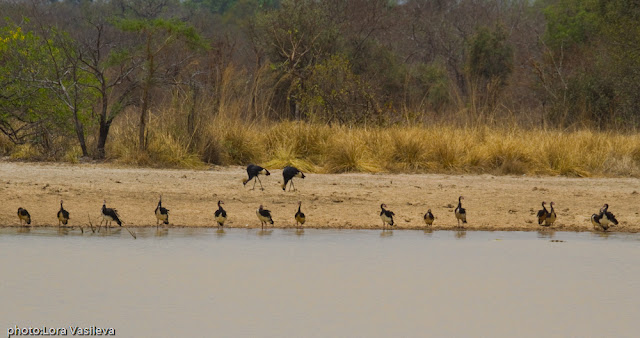

 |
| marabou |
 The park was really big. Only until we reach the first lake, and the first animals we traveled over 30 km. Just before the lake, however, the car broke and stopped. There was no coverage on the phone and we had nothing to do but wait for some tourists to save us. At least we were near the lake where there was an alcove with shadow and tourists went to visit and watch animals drink water. Soon after a car with a white driver and five black tourists came. We thought that he was their guide and was quite surprised. It turned out, however, that he is pastor from the United States named Matthew, who brought Togolese friends in the park. Because the local could not afford it, he came several times a year and led a group Togolese people on his expense. Because Africa is for Africans and parks with animals should not be "only for white”. Matthew knew the director of the park and they went together toward the exit to seek help. We stayed with Togolese at the lake and watched animals and birds, drinking water and groups of tourists who came, took photos and go. We waited four hours, our water finished and we got quite hungry. Fortunately a bus with Jehovah's Witnesses pitied us and gave us to eat from their food and a bottle of cold water. Finally, at 16 o’clock Dzhafaru and Matt came back and said that a new car will come later and now we will go on the roof of Mat’s SUV. We drove many miles along the antelopes, monkeys and birds to the only hotel in the park. They left us to sleep at 5 km from the hotel and Dzhafaru said he would take us at 8 am for a drive.
The park was really big. Only until we reach the first lake, and the first animals we traveled over 30 km. Just before the lake, however, the car broke and stopped. There was no coverage on the phone and we had nothing to do but wait for some tourists to save us. At least we were near the lake where there was an alcove with shadow and tourists went to visit and watch animals drink water. Soon after a car with a white driver and five black tourists came. We thought that he was their guide and was quite surprised. It turned out, however, that he is pastor from the United States named Matthew, who brought Togolese friends in the park. Because the local could not afford it, he came several times a year and led a group Togolese people on his expense. Because Africa is for Africans and parks with animals should not be "only for white”. Matthew knew the director of the park and they went together toward the exit to seek help. We stayed with Togolese at the lake and watched animals and birds, drinking water and groups of tourists who came, took photos and go. We waited four hours, our water finished and we got quite hungry. Fortunately a bus with Jehovah's Witnesses pitied us and gave us to eat from their food and a bottle of cold water. Finally, at 16 o’clock Dzhafaru and Matt came back and said that a new car will come later and now we will go on the roof of Mat’s SUV. We drove many miles along the antelopes, monkeys and birds to the only hotel in the park. They left us to sleep at 5 km from the hotel and Dzhafaru said he would take us at 8 am for a drive.


 The next day he came with a new SUV and we drove around until noon in search of lions, but we didn’t see any. We saw elephants and buffaloes, and yet we were happy. We went to the hotel and talked with Matt there. He was a really nice guy of 37 and had the same views as us. We talked about Africa, America and Bulgaria. We laughed about Obama fashion in Africa and agreed that it is merely a pawn in the system, set to calm racial tensions and make the impression of change. But actually there was no change. Presidents will not improve the world. We decided to stay another day and leave together with Dzhafaru. In the afternoon we went for a walk again. Everybody was searching for the lion that came out only in the evening for hunting. We walked everywhere, met antelopes, elephants, birds marabou and at the end of the day we saw the SUV of Matthew, stopped in the middle of the road. We knew immediately that they saw something interesting and we stopped next to them. They showed us the nearby bushes, where two lionesses were hiding. We were all very happy and content returned to the hotel. This time, we put the tent next to the hotel for free. We spent 2 wonderful days here. According to all this is the best park in West Africa. We didn’t see the attraction – the cheetah, but we left it for the next time. What makes us sad was that there was a large territory for hunting and in fact 68% of the visitors are hunters. We could not imagine what kind of people come to Africa to kill wild animals. How you can see a beautiful antelope or a lion and shoot it and then take a photo with the dead body and show off to your friends at home what a man you are.
The next day he came with a new SUV and we drove around until noon in search of lions, but we didn’t see any. We saw elephants and buffaloes, and yet we were happy. We went to the hotel and talked with Matt there. He was a really nice guy of 37 and had the same views as us. We talked about Africa, America and Bulgaria. We laughed about Obama fashion in Africa and agreed that it is merely a pawn in the system, set to calm racial tensions and make the impression of change. But actually there was no change. Presidents will not improve the world. We decided to stay another day and leave together with Dzhafaru. In the afternoon we went for a walk again. Everybody was searching for the lion that came out only in the evening for hunting. We walked everywhere, met antelopes, elephants, birds marabou and at the end of the day we saw the SUV of Matthew, stopped in the middle of the road. We knew immediately that they saw something interesting and we stopped next to them. They showed us the nearby bushes, where two lionesses were hiding. We were all very happy and content returned to the hotel. This time, we put the tent next to the hotel for free. We spent 2 wonderful days here. According to all this is the best park in West Africa. We didn’t see the attraction – the cheetah, but we left it for the next time. What makes us sad was that there was a large territory for hunting and in fact 68% of the visitors are hunters. We could not imagine what kind of people come to Africa to kill wild animals. How you can see a beautiful antelope or a lion and shoot it and then take a photo with the dead body and show off to your friends at home what a man you are.






 |
| one of the 10 antelope species here |
 We left the morning with Dzhafaru and asked him to leave us on the road 20 km after the park near a waterfall. There was a huge deep pool for swimming and rocks to jump from the waterfall. We had all day in the cool water. Later Matt and his friends came and after came a large group of hunters with even a larger group of local staff. First the locals arrived with bags of dead partridge, made a fire started plucking the birds. Then the hunters came and pulled themselves cold beers. All they were bragging that they themselves killed the partridges and seemed very proud of it. They were elderly Frenchmen with 2 large women.
We left the morning with Dzhafaru and asked him to leave us on the road 20 km after the park near a waterfall. There was a huge deep pool for swimming and rocks to jump from the waterfall. We had all day in the cool water. Later Matt and his friends came and after came a large group of hunters with even a larger group of local staff. First the locals arrived with bags of dead partridge, made a fire started plucking the birds. Then the hunters came and pulled themselves cold beers. All they were bragging that they themselves killed the partridges and seemed very proud of it. They were elderly Frenchmen with 2 large women.


In the afternoon we went back on the dirt road and after 2-3 hours the first car that passed took us for Tangeta. The next day we got back to Dzhugu. There we had to catch a the road to Ndali where the main road to Niger is. The road was perfect, brand new asphalt, but there was no traffic- nor trucks or cars. It was Sunday - the day of elections. We walked 5-6 km and we got 2 guys with motorbikes for more 20 km. Then we walked another 10 km to a larger village. There we ate rice, filled with sand and “gato” observed by a crowd of 20th children. We waited another hour on the road with the audience of children, which was increasing. Finally a SUV picked us. It was not quite in our direction, but at least he left us on the main road to Niger. Almost immediately we rode a truck with one Beninoa. The police post before any city trucks gave money to the police because there was always something not in order with their documents or their truck. Even the Burkinabe’s truck with oil, saying that all documents are ok, had to give 1000-2000 CFA in every post. Our driver went with 10,000 CFA to the police, but they did not accept them. They wanted 50 000 CFA (about 80 euros). Finally, after long talks they let us go against 30 000. That was half the monthly salary of driver, and from Cotonou to Burkina there were at least 20 police posts. The truck went 250-300 km in our direction, but the road was terrible and we could not get that far. After bumping for 2-3 hours on a dirt road with potholes and we passed only 50 km and decided to go down before our teeth fell down.

 |
| our little audience |
 |
| luggage here is never too much |
 |
| The bridge over the Niger River, which separates Niger from Benin |
|
|
The next day we did not want to stop trucks and one SUV took us almost to the border. Since there already was a good road and again we took a truck. They were Beninoa and Burkinabe going to Niger, Maradi - exactly the border with Nigeria, which we wanted to cross. But they had to stay at customs, 7 km before the border and there we parted and went on foot. The border was the bridge over Niger River. On the other side of the river was Niger.
Children in the area of Paraku welcomed us with the
quite impolite song: "Goodbye! Gift!"




